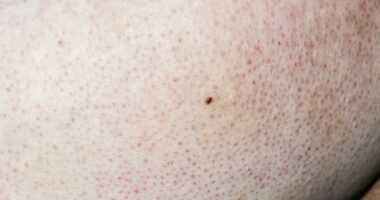Share this @internewscast.com
Imagine sleeping 20 hours a day and still waking up feeling exhausted. You miss school, forget conversations, and feel disconnected from your own life. For some teens, this isn’t simply burnout—it’s Kleine-Levin Syndrome (KLS), a rare but genuine brain disorder that disrupts everyday life.
Often mistaken for laziness or depression, it is neither. It is a legitimate neurological condition. Though uncommon, it primarily affects young people, especially teenage boys. Episodes can be recurring, and when they occur, life feels paused. Even those closest to you might not fully grasp what’s happening.
Now let’s explore what exactly Kleine-Levin syndrome is, where it comes from, how it feels, and how it can be treated.
What Is Kleine-Levin Syndrome (KLS)?
Kleine-Levin syndrome is a rare and intricate neurological disorder. It results in repeated bouts of excessive sleep, behavioral changes, and confusion. Someone with KLS might sleep 18 to 20 hours a day during an episode and still feel fatigued upon waking.
These episodes can last days, weeks, or even longer, and between episodes, the person usually returns to normal.
This condition mostly affects teenage males, although girls and adults can also get it. Most cases begin around adolescence. As per records from NIH, only 1 to 5 cases per million population have been documented globally so far.
The disorder tends to last several years. However, the frequency and severity of episodes may decrease over time. The cause is still unknown, but there are strong links to brain inflammation, viral infections, and even genetic traits in some families.
What Causes KLS Episodes? (And Why It Happens Suddenly)
The exact cause of Kleine-Levin syndrome remains unclear. But over the years, patterns have been noticed. Several potential triggers include:
- Infections (especially viral)
- Physical trauma or head injury
- Emotional stress or mental pressure
- Lack of sleep before an episode
- Autoimmune responses
During an episode, blood flow to the thalamus and hypothalamus (parts of the brain controlling sleep and appetite) is disturbed. This disturbance affects memory, appetite, and emotions as well.
Kleine-Levin syndrome is not classified as a mental illness. Nor is it a behavioral issue. It’s a neurological condition with physical and biological roots.
Signs and Symptoms of Kleine-Levin Syndrome
Each episode follows a distinct pattern and may include the following symptoms:
- Hypersomnia: Sleeping 18+ hours per day, often in deep, uninterruptible sleep
- Cognitive Impairment: Confusion, memory problems, slurred speech, poor concentration
- Mood Changes: Irritability, aggression, or emotional instability
- Hyperphagia: Unusual and excessive hunger; frequent binge eating
- Sexual Disinhibition: Inappropriate or increased sexual behavior in some cases
- Disconnection: A feeling of being in a dream-like or altered state
- Amnesia: Limited or no memory of what occurred during the episode
Once the episode ends, the person returns to their normal self — alert, functional, and unaware of what exactly happened.
Many mistake KLS symptoms for drug abuse, severe depression, or laziness — but the abrupt return to normalcy is a unique sign of KLS.
How Long Do KLS Episodes Last? And When Will It Stop?
Kleine-Levin syndrome comes in episodes that vary widely in length and frequency:
- Each episode may last a few days or up to 3 weeks, or more.
- In between episodes, the person feels and behaves completely normal
- A person may have one or two episodes per year, or several.
Over time, the number and intensity of episodes might reduce. The full disorder may last 8–14 years, with symptoms gradually fading in many cases.
However, the unpredictable nature of KLS can lead to:
- Missed school or college exams
- Inability to hold a job
- Isolation and lowered self-esteem
Keeping a journal of symptoms, sleep hours, and behavior changes can help families and doctors better manage the condition.
How Is Kleine-Levin Syndrome Diagnosed? Tests & Checklist
There’s no single test to confirm Kleine-Levin syndrome. Doctors first rule out other conditions like epilepsy, brain tumors, and psychiatric disorders.
They may use:
- MRI scans to check for brain structure abnormalities
- EEG (Electroencephalogram) to rule out seizures or epilepsy
- Polysomnography (Sleep study) to monitor abnormal sleep patterns
- Blood tests to rule out infections or metabolic disorders
- Psychiatric evaluation to rule out depression or other mental illnesses
Diagnosis relies heavily on detailed medical history and family observations. Keeping logs of sleep duration, emotional changes, and odd behaviors is key.
Treatment for Kleine-Levin Syndrome: What Really Helps?
There is no known cure for KLS. But treatment can reduce symptoms and manage episodes better.
Some options include:
- Lithium – May reduce the frequency of episodes
- Stimulants – To reduce daytime sleep during episodes (like modafinil)
- Mood stabilizers or antipsychotics– help manage severe mood changes
- Cognitive behavioural therapy – To deal with memory lapses, focus loss, or anxiety
- Sleep hygiene – Regular bedtime, no caffeine, digital detox at night
Support from family, friends, and teachers can help make life easier during flare-ups.
KLS vs. Other Conditions: Key Differences
|
Condition |
Main Symptom |
Key Difference |
|
Kleine-Levin Syndrome |
Hypersomnia & memory issues |
Episodic pattern, sudden onset & return to normal |
|
Narcolepsy |
Sleep attacks anytime |
Happens daily, not in long episodes |
|
Depression |
Sadness & low energy |
No sudden extreme sleep or hunger |
|
Epilepsy |
Seizures |
Physical convulsions, not long sleep |
|
Brain tumor |
Pressure symptoms |
Progressive, not episodic |
Real-Life Tips to Cope With KLS (For Families Too)
Life with Kleine-Levin syndrome is hard, not just for the person, but for the family too. Missing school, being misunderstood, and social isolation are all real challenges.
However, some lifestyle practices can help:
- Keep a KLS diary to track episode patterns
- Create a supportive daily routine
- Use visual timers or alarms for reminders
- Limit screen time and late nights
- Practice grounding techniques during confusion episodes
Awareness matters. When others understand what you’re going through, support becomes stronger.
What to Eat During and After KLS Episodes
Nutrition plays an important role in recovery:
- Eat: Whole grains, fresh fruits, lean protein, and healthy fats
- Avoid: Junk food, sugary snacks, and processed carbs — even if cravings are strong
- Hydration: Drink water and fluids to avoid dehydration, especially after extended sleep
Focus on nutrient-rich meals that aid brain function and energy restoration.
KLS in Teenagers vs Adults: Is There a Difference?
Yes. While the core symptoms are similar, there are some differences:
|
Age group |
Symptoms |
Notes |
|
Teenagers |
Longer, more intense episodes |
Often irritable or aggressive |
|
Adults |
Shorter, but more frequent episodes |
Tend to appear apathetic or withdrawn |
Emotional symptoms may vary, too; teens may lash out, and adults may shut down.
Final Thoughts: Take Action Before the Next Episode Strikes
Kleine-Levin syndrome can leave life upside down for those affected. It’s unpredictable, confusing, and emotionally draining. But with the right care, support, and information, it can be managed.
If you or your child shows signs of repeated, extreme sleep episodes with memory issues and personality shifts, don’t wait. Talk to a neurologist. Track symptoms. Keep records. Awareness is the first step towards a safer, more balanced life.
Remember, Long sleep cycles aren’t always laziness. Sometimes, they’re a call for medical attention. And when it’s KLS, early action can make all the difference.
FAQs
1. Is Kleine-Levin syndrome permanent?
No, most patients outgrow the disorder after several years, especially when episodes become less frequent.
2. How is Kleine-Levin syndrome different from narcolepsy?
Narcolepsy causes brief sleep episodes anytime, while KLS leads to long, deep sleep periods that last days or weeks.
3. Can Kleine-Levin syndrome be inherited?
While most cases are random, some reports suggest a family connection. But no gene has been clearly identified yet.
4. Can women get KLS?
Yes, though less common, females can also develop Kleine-Levin syndrome. The symptoms are similar.
5. Is it safe to drive or work during a KLS episode?
No, it’s not safe. The person may be too disoriented, sleepy, or confused to drive or perform tasks safely.
















